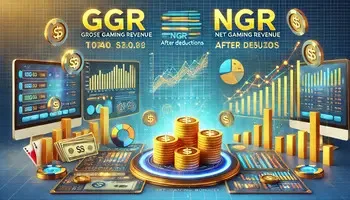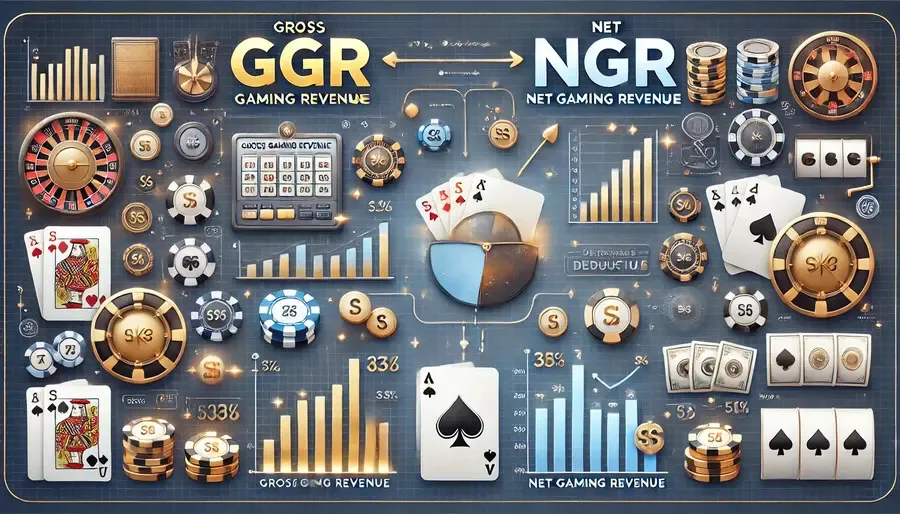
GGR and NGR: Critical Metrics for Casino Operators
Understanding key financial metrics is essential for both players and casino operators. Among these, Gross Gaming Revenue (GGR) and Net Gaming Revenue (NGR) are two of the most important indicators. They define how much revenue a casino generates and what remains after various deductions. While casual players might not pay much attention to these figures, they are critical for operators who manage casino platforms such as Casino Quigioco.
Both GGR and NGR impact everything from taxation to profitability, shaping the online gambling industry. In this article, we will break down these terms, highlight their differences, and explain why they matter to both players and operators. By understanding these metrics, players can get insights into how casinos operate, while operators can fine-tune their financial strategies.
What is GGR (Gross Gaming Revenue)?
Gross Gaming Revenue (GGR) represents the total amount of money wagered by players minus the winnings paid out. It is the raw revenue that an online casino accumulates before deductions such as bonuses, operational expenses, and taxes. This metric provides a clear picture of the casino’s financial activity at a high level.
For example, if players at Casino Quigioco wager $10 million in a month and win back $7 million, the GGR would be $3 million. This calculation gives operators a straightforward measure of how much money is flowing into the business before any costs are considered.
GGR is widely used by regulators and investors to assess the performance of a casino. It is also the foundation for taxation in many jurisdictions, meaning that governments often collect taxes based on a percentage of GGR.
What is NGR (Net Gaming Revenue)?
Net Gaming Revenue (NGR) is a more refined metric that accounts for various expenses deducted from the GGR. These deductions include player bonuses, affiliate commissions, software licensing fees, and taxation. NGR provides a more accurate representation of the actual profit that a casino retains.
For instance, if a casino’s GGR is $3 million but it spends $500,000 on bonuses, $300,000 on affiliate commissions, and $200,000 on licensing fees, the NGR would be $2 million. This figure is crucial for operators, as it determines how much money is left after operational costs.
Unlike GGR, which is primarily used for taxation, NGR helps in strategic decision-making. It allows casinos to assess their profit margins and adjust promotional strategies accordingly.
Main Differences Between GGR and NGR
The primary difference between GGR and NGR lies in the deductions applied. While GGR represents total earnings before any costs, NGR provides a clearer view of actual profitability. This makes NGR a more relevant metric for casino operators looking to optimize their financial strategy.
Another key distinction is how these metrics are used for taxation. Many gambling jurisdictions impose taxes on GGR rather than NGR, which can lead to significant financial implications for operators. Some regions, however, allow operators to deduct specific costs before taxation, making NGR a more relevant figure.
GGR is a broad indicator of market performance, often used by investors and regulators to gauge industry trends. In contrast, NGR is more relevant for internal financial planning, as it reflects the actual revenue retained by the operator.
Bonuses and promotions significantly impact NGR but do not affect GGR. If a casino offers generous bonuses, its GGR remains unchanged, but NGR will be lower due to increased marketing expenses.
Affiliate partnerships also affect NGR. Many casinos rely on affiliates to drive traffic, and commissions paid to these partners reduce the NGR without influencing the GGR.
Regulatory costs, including licensing fees, compliance costs, and anti-fraud measures, also decrease NGR. As a result, operators must balance high GGR with effective cost management to maintain profitability.
In summary, while both metrics are essential, GGR provides a macro view of revenue, whereas NGR offers a detailed insight into actual earnings after expenses.

How GGR and NGR Affect Gambling Operators
For casino operators Quigioco, the balance between GGR and NGR is crucial. A high GGR does not necessarily mean a casino is profitable, as expenses can significantly reduce the final NGR.
Operators must optimise their promotional campaigns and player incentives to ensure that marketing costs do not eat too deeply into NGR. Striking a balance between player acquisition and profitability is key.
Licensing and regulatory costs also play a significant role. Different jurisdictions have varying taxation models, with some taxing GGR while others consider NGR. This affects how operators structure their businesses.
Finally, operational efficiency matters. Payment processing fees, fraud prevention measures, and software costs all contribute to the difference between GGR and NGR, making effective financial planning essential.
The Role of Regulation and Taxation in GGR and NGR
Regulatory frameworks heavily influence how casinos report GGR and NGR. Governments often impose strict reporting standards to ensure transparency and compliance.
Some jurisdictions tax GGR, meaning operators must pay a fixed percentage of total wagers minus player winnings. This can be challenging, as it does not consider marketing and operational expenses.
Other regions tax NGR, which allows casinos to deduct promotional costs and other expenses before taxation. This approach is often preferred by operators as it accounts for business expenses.
Compliance requirements, such as responsible gambling initiatives and anti-money laundering measures, also influence NGR. These obligations increase operational costs, reducing the final revenue casinos retain.
Ultimately, taxation and regulation play a decisive role in how profitable a casino can be, making financial planning a necessity for operators.
Real-Life Examples of GGR and NGR Governance
Different countries approach GGR and NGR taxation in various ways, directly impacting casino operations. In the UK, operators are taxed on GGR, which simplifies reporting but may lead to higher financial burdens.
Malta, a major hub for online casinos, allows operators to deduct specific costs before taxation, making the NGR model more beneficial. This flexibility attracts many gambling businesses to the jurisdiction.
In the US, regulations vary by state. Some states, such as New Jersey, impose taxes on GGR, while others allow deductions based on NGR calculations.
Operators like Casino Quigioco must carefully consider these factors when choosing where to obtain their licenses. A favourable regulatory environment can significantly impact profitability.
As the online gambling industry continues to evolve, the distinction between GGR and NGR will remain critical for both regulatory bodies and operators seeking sustainable growth.
